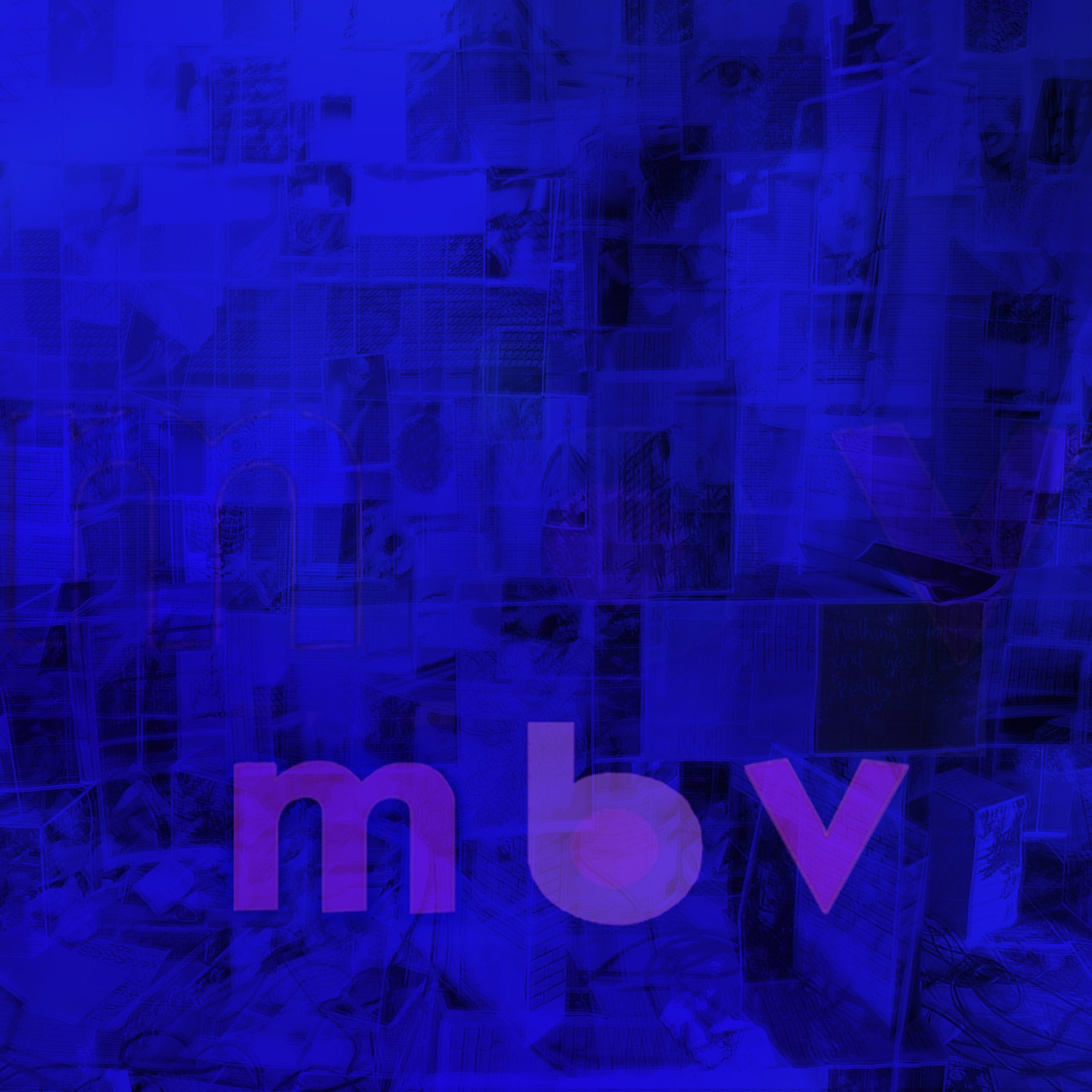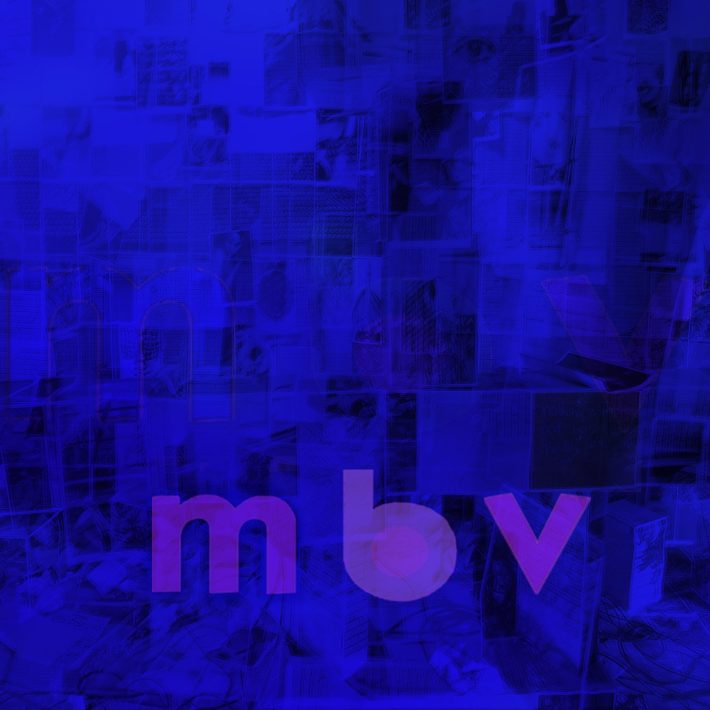- mbv/Domino
- 2013
By 2013, the legend of Loveless had amassed impossible weight. My Bloody Valentine's sophomore album had long since been codified as one of the masterpieces of the '90s, one of the masterpieces of alternative music period. A singular vision that begat legions of copycats, a whole genre. Twenty-two years after its release, countless words and breathless accolades had established it as one of those classics that could never be repeated. During my last semester of college in the first half of 2013, a music writer some 15 years my senior visited our pop culture criticism class and told us that when he's cut he bleeds the color of the Loveless cover. This was hallowed territory. My Bloody Valentine had made an album that reoriented what seemed possible with sound, with the limits of guitar-based rock music, and then they had never followed it up. Because, of course, how could you?
Part of the legend was how Loveless itself barely made it out into the world. What Creation Records originally thought could take days took three years. The lore says that the album's seemingly tortured genesis nearly bankrupted Creation, prompting Alan McGee to drop the band soon after its release; Kevin Shields has always claimed that wasn't true. Part of the legend is what happened after — MBV going to the majors with Island, spending some chunk of the '90s trying to produce a successor to Loveless. The band dissolved over the course of the mid-'90s, Shields says he went a bit crazy, In 2001, Island sued Shields because he hadn't released any music in the 10 years their deal had existed.
All of this fuels a particular, well-worn trope, the idea that Shields was one of those difficult, mercurial, reclusive artists. In many interviews from more recent times, the writers still seem surprised to report that he's a relatively normal and fluent conversationalist, if bearing a somewhat idiosyncratic definition of time's passage. But even along the way, he was never out of sight for too long — touring with Primal Scream, occasionally collaborating with other artists, making music for Lost In Translation. Once My Bloody Valentine regrouped for their infamously blistering 2008 tour, there was talk of new music. But everyone had bought the legend by then. No matter how much you saw Shields reappear, no matter the band being present onstage, we had accepted there would likely never be another My Bloody Valentine album. They had given us Loveless, after all. That was enough. How could you follow up an album of that stature, an experience so life-altering? It made sense to not even bother.
In January of 2013, Shields went on the internet and claimed the new My Bloody Valentine album would be out in a matter of days. He'd talked about new music at various points in the '00s, and at this point, it was hard to believe him. But then, suddenly, in the middle of the night on Feb. 2, it was true. Ten years ago today, m b v arrived on the band's site and promptly crashed it as fans swarmed to download it. The thing nobody thought would ever happen was real. After 22 years, there was, somehow, a My Bloody Valentine album after Loveless.
m b v was one of those collective musical experiences that, in the '10s, primarily came from surprise releases from major artists. There was something I could never admit at the time: When I first clicked play, seated in my girlfriend's dorm, I was just a bit… disappointed. The hum and sludge of "She Found Now" was a hazy whisper of a reintroduction; I couldn't appreciate it then, in that moment, because somewhere in me I expected the long-awaited sequel to Loveless to have that earth-shattering upheaval of reality I felt the first time I heard "Only Shallow." Anecdotally, it seemed like I was in the minority, particularly when you considered the writers reviewing m b v at the time. Many who were around when Loveless had arrived immediately viewed this as the second coming that was promised, and thus were appropriately rapt.
At the time, it seemed as if Shields almost anticipated a reaction closer to mine — for some listeners to be confused or disappointed this didn't repeat Loveless. In August of 2013, he told Pitchfork he expected the album to make sense in a few years. He noted in that same interview that people started to hear it in thirds. As he defined people's reactions: "the first bit's a continuation from Loveless, the second goes off into something different, and the end is going into the future." Most of it made sense. The My Bloody Valentine we knew and loved had finally put out new music — much of it retaking the crown from pale imitators, some of it offering small tweaks on the specific, horrifying beauty they'd perfected in 1991.
So, contrary to Shields' assertion that m b v might not make sense at first, it's not exactly a difficult album. The first three songs indeed continued apace from Loveless, though there was something grainier and more guttural about them — not the exact same euphoric wash as their predecessors. It was in the middle passage that things started to get really interesting. "Is This And Yes," "If I Am," and "New You" were a softer trilogy featuring Bilinda Butcher on vocals — first over droning keys, then in a song that sounded like reflections warping in water, and finally in one of the purest, most addicting pop songs MBV ever recorded. All these years later, even if it's been a while since I've revisited m b v as a whole, "New You" gets stuck in my head frequently.
Then things pivoted again for the final third. From that blissed-out middle, m b v rocketed off into someplace alien and haunting. These were the songs that people often figured derived from Shields' late-'90s fascination with jungle, given their more visceral percussive backdrops. "In Another Way" was the intensifying maelstrom, "Nothing Is" a snarling, vicious instrumental. Then the album ended with "Wonder 2," which was like Shields returning after a couple of decades with shoegaze's equivalent of "Tomorrow Never Knows." It was a mesmerizing, unnerving piece of work, the band obliterating the past with all manner of warped, discomfiting sounds. If there'd been any doubt about MBV's return, those final few songs laid it to rest. There were yet new horizons for them to chase.
Whether or not that denotes "the future," as Shields put it, still remains to be seen. In that same 2013 interview, he said the goal for the next year was to record another album. We all know how that has gone. It has been 10 years, and MBV have been far more active than they had in the 22 between Loveless and m b v, but despite the ongoing promise of new material, it has, of course, yet to materialize. In 2017 it was going to be a new "all over the place" album. In 2018 it was going to be some EPs. Most recently, in 2021, Shields told the New York Times the band was close to finishing two albums — one "warm and melodic" and another more experimental. Ultimately m b v made the the band's resurrection feel more concrete, but it did not signify a change in old behaviors.
Now, it's been another long wait full of promises of new music. But it's not the same as it was after Loveless. Nothing really could be; m b v is not Loveless, and its very existence fractured the mystique inherent in the idea of a band releasing an album like Loveless and then disappearing into the ether they once so convincingly conjured in their music. It's not as feverish or dizzying to imagine another new My Bloody Valentine album now, nor do the stakes feel as high as they did during those 22 years. m b v lives on as a strange unicorn of the '10s and as more stunning My Bloody Valentine music — a worthy enough followup that couldn't help but fail to repeat the seismic ramifications of Loveless. If there are any pangs this time around, it's wondering what that future promised in "Wonder 2" could be — wondering if someday MBV will return as 60-somethings and, one more time, show us things we never knew existed.
We rely on reader subscriptions to deliver articles like the one you're reading. Become a member and help support independent media!







